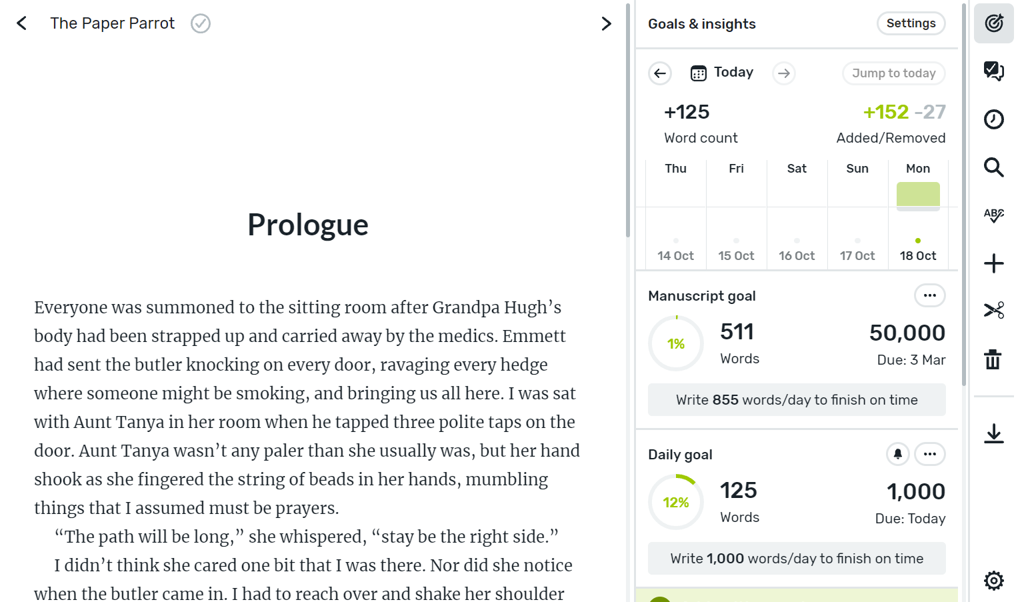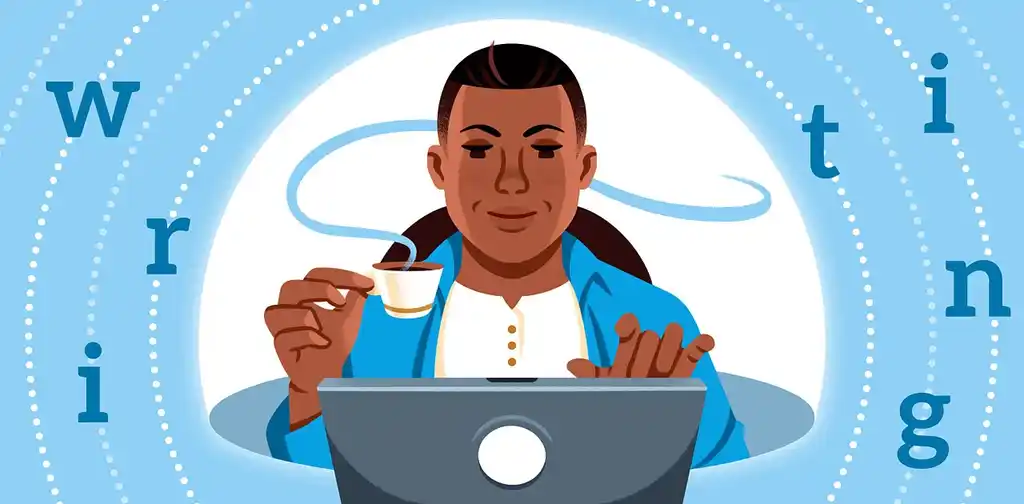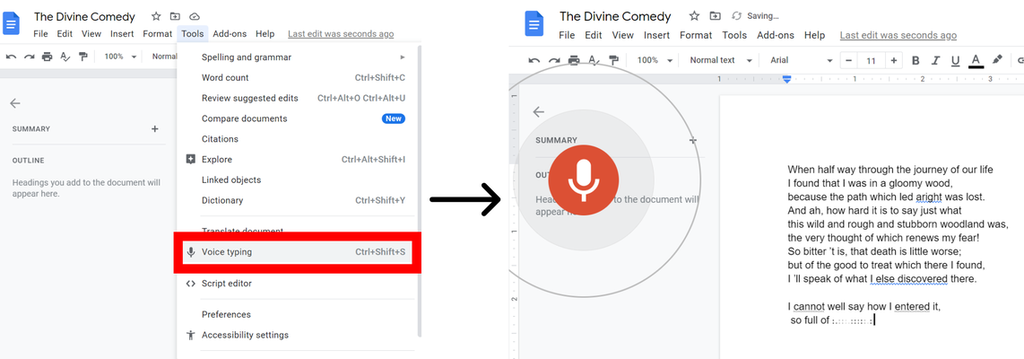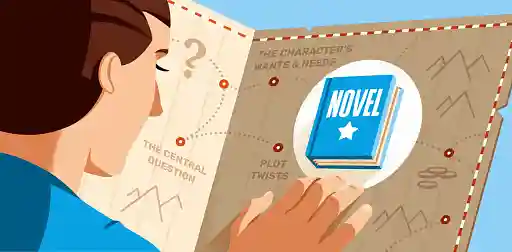Last updated on Apr 21, 2022
How to Write Faster: 8 Strategies for Productivity
Slow writing is a challenge that every author faces — one that can be particularly frustrating to tackle. So, if you want to save time, publish more books, or simply finish your project, here are eight tricks and strategies for writing faster:
1. Minimize distractions
Writing requires focus, so find a distraction-free environment that works for you. For some people that means leaving the house and writing from coffee shops or libraries, while for others it comes down to curating their perfect writing environment.
The internet, of course, is one of the biggest challenges in terms of distraction. To protect yourself from being pulled away from your novel, leave your phone in another room and set specific hours to surf online (i.e. from 7 to 8 in the morning/evening). If you need the Internet for research, you can always use apps like Self-Control or Cold Turkey to block specific websites during your golden hours (adiós, Twitter rabbit holes!)
Put on some noise-canceling headphones or your favorite writing playlist, open up your writing software and get in the zone.
🎵
Tell us about your book, and we'll give you a writing playlist
It'll only take a minute!
2. Do word sprints
Ever heard of word sprints? Just like a sprint race, the idea behind it is to write as much as possible, as quickly as possible. Try a 10-minute session at first, then push yourself to “sprint” for longer if you find that it successfully opens your creative floodgates. Who knows, maybe you’ll even write a novel in 30 days at the next NaNoWriMo!
This strategy is ideal for those who struggle to find long stretches of time to write during the day. A 15-minute word sprint in the morning and another in the evening will see you making substantial progress with your book.
You can pair up with a friend or someone from an online writing community to provide accountability and boost each others’ productivity. For example, you could do simultaneous word sprints and before reporting back on your respective word counts. Try to set a friendly-yet-determined tone — while you don’t want to feel combative, you do want to have a sense of urgency around writing.

3. Try the Pomodoro Technique
The Pomodoro Technique is a time-management method that can be used to write more productively. The rules are simple: write uninterrupted for 25 minutes, then take a break of 5 - 10 minutes. One session equals one pomodoro (Italian for tomato, a reference to old tomato-shaped kitchen timers). After four 25-minutes writing sessions, you can take a longer break of 20 to 30 minutes. Then rinse and repeat.
It’s a simple technique to make yourself accountable and find a workflow. And don’t worry, you don’t need a kitchen timer to track your time: there are plenty of apps and websites that can do it for you.

FREE COURSE
How to Build a Solid Writing Routine
In 10 days, learn to change your habits to support your writing.
4. Set small goals and rewards

Many writers make the mistake of only rewarding themselves when they finish their manuscript. However, creating a book is a long and exacting process, and if the reward seems to be too far away, you may not be as motivated to write.
Research shows that, in order to pursue long-term goals, we need to set smaller, achievable writing goals for ourselves. Every time we succeed in achieving a goal, no matter how small, the brain rewards us with dopamine and motivation to keep going (even with an ADHD brain).
As an author, that means creating a system of smaller goals and rewards for your daily writing sessions. For example, if you write 300 words in a day, you get to watch an episode of whatever show you're in the middle of. If you do it for six days in a row, you buy yourself a new book. When you finish a whole chapter, treat yourself to a nice dinner out!
Having a short-term finish line and trophy within reaching distance will help you to write more and, eventually, get your book to the finish line.
To better visualize your progress, you can use our Reedsy Studio, a free writing app that will automatically calculate and display your daily word count. You can also set friendly email reminders that nudge you to write in case you fall back on your set goals.

FREE WRITING APP
Reedsy Studio
Set goals, track progress, and establish your writing routine in our free app.
5. Use placeholders
Sometimes authors write slowly because they encounter a scene or paragraph that they don't know how to write, or that requires further research. It’s easy to struggle and tinker with these parts forever, never making real progress.
Have you ever spent 20 minutes digging through a thesaurus, trying to find the perfect word before it escapes from the tip of your tongue? You feel that a breakthrough is right around the corner but, if you’re honest with yourself, it will elude you.
When you are stuck with a word or a scene, you can temporarily bypass it by putting a placeholder to remind you to revisit it later. A common trick is to use the capital letters TK (an intentional misspelling of “to come”). Since this letter combination doesn't appear very often in the English language, it's easy to search it in the document when you want to edit it, and it won’t be confused for part of the final copy.
6. Write without looking at the screen
Sometimes the biggest source of distraction is your own words on the screen! There’s no greater productivity killer when writing than stopping to edit. That’s why the process of editing your book should always come at a later phase.
To calm the impulse to continuously edit, try writing without looking at the screen. A couple of tricks you can use are typing with a wireless keyboard from the other side of the room, or turning the brightness on your laptop all the way down.
It can be weird to not see the words you’re typing, but it can truly make a difference in speed, especially when combined with techniques like the word sprint!

FREE COURSE
How to Write a Novel
Author and ghostwriter Tom Bromley will guide you from page 1 to the finish line.
7. Use speech-to-text dictation
Most of us think faster than we type, and many writers aren’t the most proficient typists, to begin with. If this is a problem for you, consider using the speech-to-text function to dictate your manuscript. This option is offered by word processors like Microsoft Word and Google Docs, as well as services like Descript, Otter.ai, and Dragon Professional.

Dictating your novel will require a big edit to polish your first draft, but it might help you capture a scene more naturally than if you were to type it. Give it a try and you may end up a speech-to-text convert, too… especially when you see how much faster it helps you write.
8. Visualize the scene before writing it
One of the reasons writers experience writer's block is because they try to think through a scene while also writing it, which can break their creative flow. If this sounds like you, try visualizing a passage in your head for a few minutes before you jot it down.
Think through the scene like it's a movie playing in your head: imagine the characters' sensory experiences, thought processes, and speech. Once the narration is clear in your head, put it into words. Not only will you write faster, but also with greater excitement about the story itself!
These individual techniques will all help you write faster, but combining them together will give you true superpowers. Next time you're stuck, try a couple of them out and you may just find yourself finishing your book faster than you think!











2 responses
batmansbestfriend says:
10/12/2019 – 14:03
I always find that if I have enough caffeine over the course of the day I can usually hit my daily quota in about half or a third of the time...and the quality is usually slightly better (in terms of having to do less rewriting). However, this only works if I've gone over the scene in my head enough that I feel like I've personally lived it. So, the take away is: know what you're going to write before you write it and you'll have that much of an easier time.
Anne Hagan says:
14/02/2020 – 16:11
I like numbers ten and eleven a lot. I've never given a thought to doing something like #10, writing like a child, but I use #11 all of the time. I start with a detailed outline. If I'm not 'feeling' the next scene, I move on to something that does move me - usually a dialog heavy scene. Often I can go back to the troublesome scene later and work it out or I eliminate as unnecessary to begin with.